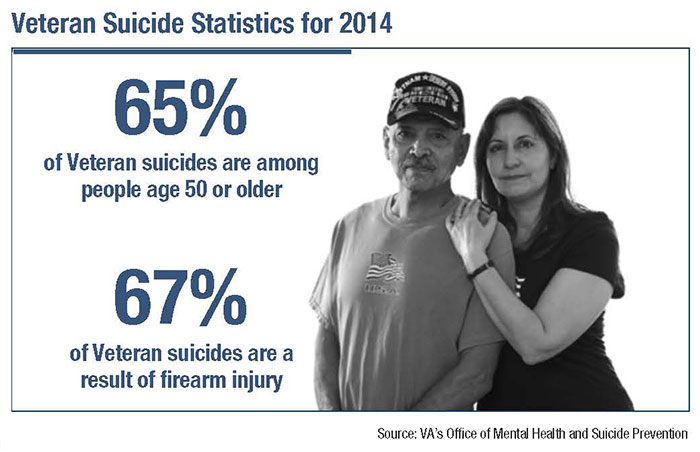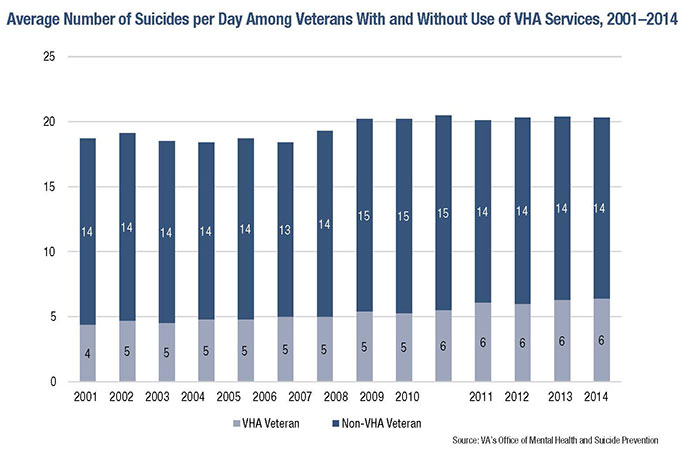
|
|
Research HighlightResearch Seeks to Better Understand the Relationship between Combat-related Killing and Suicidal IdeationKey Points Killing in war is an understudied risk factor for suicide among Veterans and military personnel.
While there is ample evidence to suggest that killing in war may be a potentially morally injurious experience for Veterans, less evidence exists on how combat-related killing may affect suicide-related outcomes (e.g., suicidal ideation, suicide attempt, suicide). To better understand whether killing in war contributes unique risk to suicidal ideation, we analyzed data obtained from a cross-sectional, nationally-representative sample of Vietnam Veterans from the National Vietnam Veterans Readjustment Study. Veterans who had higher killing experiences were twice as likely to report experiencing suicidal ideation, compared to those with lower or no killing experiences even after adjusting for demographics, depression, posttraumatic stress disorder (PTSD), substance use disorders, and combat exposure.1 Next, we examined whether killing in war was associated with suicidal ideation among individuals who had served in more recent conflicts, and whether mental health symptoms mediated this association. Data were collected from 2,854 U.S. soldiers returning from deployment in support of Operation Iraqi Freedom (OIF) as part of a post-deployment screening program at a large Army medical facility.2 Depression and PTSD symptoms mediated the association between killing in combat and suicidal ideation, while PTSD symptoms mediated the association between killing in combat and desire for self-harm. These results provided preliminary evidence regarding different mechanisms of risk that may explain the association between killing and suicidal ideation. Further, these results underscored the importance of screening for and treating PTSD and depressive symptoms among OIF soldiers who experienced killing. 
An Understudied Risk FactorBased on these and other studies that have found killing to be associated with suicidal ideation and attempts, we posit that killing is a potentially important and understudied evaluation and care of Veterans. To guide future research in this area, one framework for more deeply understanding the relationship between combat-related killing and suicide-related outcomes, as well as some of the mechanisms that may be involved, is Joiner’s Interpersonal-Psychological Theory of Suicide (IPTS). According to the IPTS, thwarted belongingness and perceived burdensomeness cause suicidal desire, whereas painful and provocative experiences facilitate habituation to the pain and fear associated with suicide, thus increasing one’s capability to engage in suicidal self-directed violence. Although the IPTS has been studied with military and Veteran samples, it has not been applied to understanding the impact of killing on suicide-related outcomes. We recently proposed Joiner’s IPTS as a possible explanation for understanding why Veterans who have experienced war-related killing are at increased risk for suicidal ideation and suicidal self-directed violence.3 More specifically, we proposed that combat-related killing may impact suicidal ideation through its effects on perceived burdensomeness and thwarted belongingness (e.g., causing individuals to feel alienated, monstrous, or misunderstood). Further, we theorized that combat-related killing may influence risk for suicidal self-directed violence through its association with the acquired capability for suicide, both due to the direct act of killing itself, in addition to common sequelae of killing that individuals may utilize as a means of coping (e.g., substance abuse, risky behaviors). In focus groups comprised of individuals who have been impacted by killing in war, we have found that killing exposed them to the “dark side of the self,” and that this influenced their relationships, sense of belongingness, and led to withdrawal. Veterans also discussed ways in which exposure to death and dying can numb individuals—both to these experiences and to their emotional reactions. This numbing effect could subsequently result in a lower threshold and higher risk for suicidal self-directed violence. 
Determining whether the IPTS is a helpful lens through which to examine the association between killing and suicide requires further research. This includes examining whether individuals who have engaged in killing are more likely to experience perceptions of thwarted belonging, perceived burdensomeness, and higher levels of the acquired capability for suicide (e.g., fearlessness about death). If supported, identifying modifiable factors that contribute to these experiences will be critical, as well as determining the most effective means of addressing these experiences (e.g., healing from moral injury, increasing a sense of belonging and community). Currently, there are several treatments for moral injury that are supported by prior research (e.g., Impact of Killing, Adaptive Disclosure), and these can be an excellent starting point for individuals who are struggling with the impact of killing in war and other moral injuries. Overall, our research shows that military personnel and Veterans who have experienced killing in war have an increased likelihood of experiencing suicidal ideation and suicide attempts, even after adjusting for mental health and other types of war exposure. There is some research to suggest that these relationships may be mediated by mental health outcomes; however, a theoretical framework that considers the experience of killing, in addition to the multi- faceted effects of engaging in this potentially morally injurious act, may assist in further elucidating transdiagnostic mechanisms to explain the association between killing and suicide-related outcomes. Further, if supported, this framework could provide important implications for treatment targets that could be prioritized to reduce the risk for suicidal ideation and suicidal self- directed violence among Veterans who have experienced combat-related killing. References
|
|